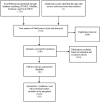Moral distress in nurses in developing economies: an integrative literature review
- PMID: 38162718
- PMCID: PMC10756174
- DOI: 10.1177/17449871231216606
Moral distress in nurses in developing economies: an integrative literature review
Abstract
Background: Moral distress has been extensively studied in developed economies; however, not much in terms of studies has been carried out in developing economies.
Objective: To review the literature reporting the experience of moral distress in nurses in health care settings in developing economies.
Design: An integrative literataure review was used.
Method: Cumulative Index of Nursing and Allied Health Literature, Medical Literature Analysis and Retrieval System Online Cochrane and Psych INFO were searched to retrieve titles and abstracts of papers on the experience of moral distress in nurses in developing economies.
Results: Sixteen articles reporting the experience of moral distress in nurses in developing economies published between 1984 and March 2019 were used for the review. Analysis of the findings revealed seven themes, nurses' experience of moral distress, inadequate material and human resources, end-of-life challenges, cultural and religious beliefs as a source of moral distress, perceived inactions of medical and nursing staff, impact of moral distress on nurses in developing economies and coping strategies.
Conclusion: There is paucity of empirical studies on moral distress in nurses in developing economies. More qualitative studies are needed in various cultural settings to enhance its understanding in nurses working in developing economies.
Keywords: dilemma; ethics; health care professionals; literature review; moral difficulties; non-Western countries.
© The Author(s) 2023.
Conflict of interest statement
The author(s) declared no potential conflicts of interest with respect to the research, authorship, and/or publication of this article.
Figures
References
-
- Bahaadinbeigy K, Yogesan K, Wootton R. (2010) MEDLINE versus EMBASE and CINAHL for telemedicine searches. Telemedicine and e-Health 16: 916–919. - PubMed
-
- Berlinger N, Berlinger A. (2017) Culture and moral distress: What’s the connection and why does it matter? American Medical Association Journal of Ethics 19: 608–616. - PubMed
LinkOut - more resources
Full Text Sources

